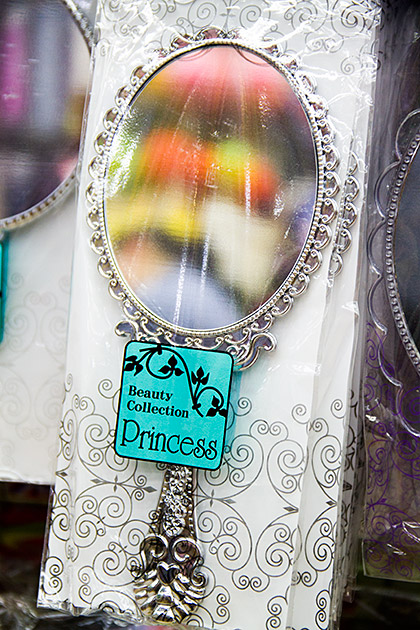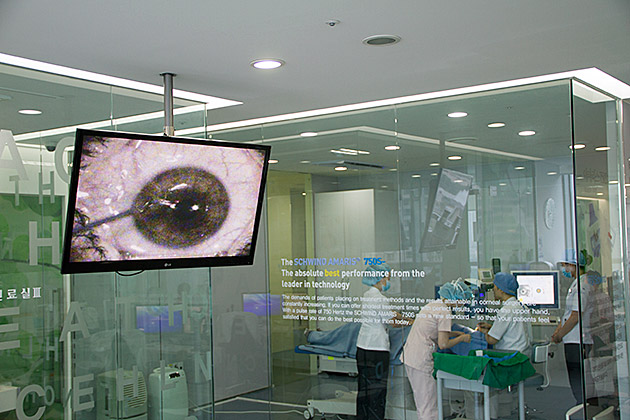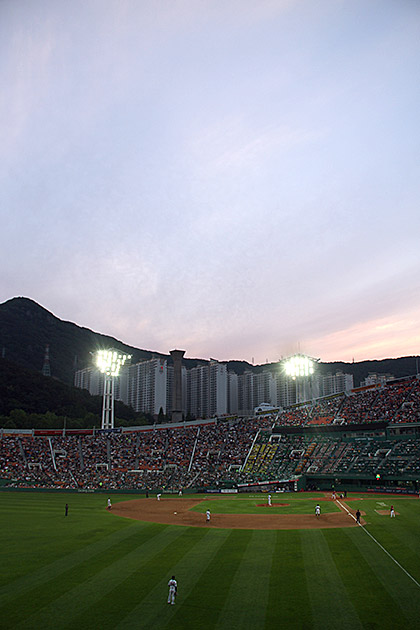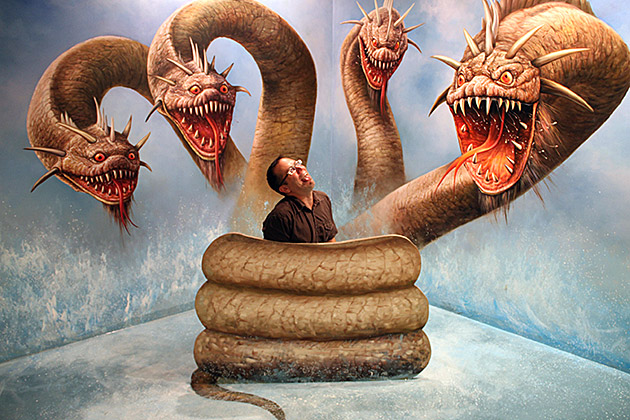South Korea’s Troubling Quest for Beauty
I doubt there’s a reflective surface anywhere in South Korea that hasn’t, at some point in its life, served as a makeshift mirror for somebody checking makeup, fixing hair, or fretting about wrinkles. We’ve never seen people so obsessed with outward appearance as Koreans. It borders on the obsessive and is so widespread, so constant, that it’s begun to worry us.

You watch kids on the subway. Many of the girls are carrying a silver hand mirror, which they’re constantly staring into. Those without mirrors, boys and girls alike, are studying themselves in the reflection of the window. You see people retouching photos of themselves on their smart phones, using digital tools which eliminate imperfections or whiten their skin.
At first, you’ll smirk. “Damn Korea, you vain!” But eventually you realize that it’s not really vanity. There’s nothing conceited or prideful about the obsessive mirror-gazing. Rather, there’s a sense of anxiety. These kids mostly seem nervous; desperate to appear as perfectly put together as possible. You start to wonder who they’re trying to please.
Then you notice the advertisements for plastic surgery plastered all over the train. You study the before and after pictures, then look around the car again. Across from you, there’s a twenty-something with her eye patched, and a girl hidden behind a face-mask and sunglasses. Very few Asians are born with so-called “double eyelids”, but most of the girls on the train have them. You look at the jawlines, and realize how many have angular, almost Western features, as opposed to the roundness usually associated with Korean faces.
Plastic surgery has reached a saturation level in South Korea that seems unthinkable in the US or Europe. Here, having your face surgically enhanced isn’t at all embarrassing. It’s not something to cover up or conscientiously ignore in polite company, but an achievement to be shared and almost celebrated. A common high-school graduation present is the “double eyelid” operation. (Before coming to Korea, I had no idea what that was; here is an explainer). Families often encourage their daughters to become beautiful via surgery, and can be openly disdainful of those who refuse it. Schoolkids too young or poor for the eyelid surgery will glue their eyelids together to achieve the desired look. Cosmetic alterations are a part of Korean life in a way that Jürgen and I have a hard time understanding.
Media, of course, plays a big role. A huge majority of the country’s actors and K-Pop superstars have had their faces restructured. There’s a very identifiable standard of beauty here, and it definitely isn’t Korean. It’s western. Wide eyes, small chin, small mouth, linear jaw. One of our friends remarked that the winner of this year’s Miss Korea was the contestant who looked the least Korean. It’s not a coincidence and it’s not altogether inappropriate. This is what a plurality of Koreans consider beautiful.
Look, I’m not going to judge anyone for getting plastic surgery; a person’s body is their own, and they can mess around with it however they want. Plastic surgery doesn’t bug me at all, and I don’t think there should be any stigma attached to it. Still: although natural Korean faces can be absolutely beautiful, entire generations are learning that their features aren’t, and could never be, beautiful enough. And that can’t be good.




This is by far one of your best articles to date. It sounds as much like good journalism as it does great info for tourists. Weird stuff. I’ve always wondered why the characters in anime films always look western rather than asian.
I’m always ambivalent regarding plastic surgery. I’m totally for artificiality, in the sense of people changing themselves aesthetically. I think it’s just one of the possible ways for humans to evolve. But whenever someone I care about talks about plastic surgery, I’m always like, “Why would you want to do that?” I think that’s a visceral, rather than a rational, reaction. I think a lot of Americans get plastic surgery and obsess over their body image. But I think we tend to displace a large portion of our mental energy regarding that stuff onto the ideals we have of celebrities — who kind of become our sacrificial victims in that sense.
Some Korean father let his daughter have breast enlargement surgery as a high-school graduation present. And the daughter brags about it and her friends feel envious or even jealous of her, saying “You have a fantastic father!”
I lived in Busan in 2006, and was flabbergasted by the ubiqity and types of cosmetic surgery. Double eyelid surgery saddened but didn’t surprise me, but other types did: “high bridge” nose augmentation, cheekbone and jaw reduction, and Botox injections into calf muscles to make them atrophy. Oh, and tongue clipping to improve English! I’m sure there are procedures even more bizarre.
I’m Korean and it’s true. Koreans have a huge issue with plastic surgery and trying to look Western. It’s really sad and unfortunate. Great article.
uh..lets get your fact right. not all asians have single eye lid, only those with chinese, korean, & japanese blood does.
Pingback: The Formidable Facial Hair of the Turks | For 91 Days in Istanbul – Travel Blog
yeah i think it is sad that there are korean women/men who want to alter their faces just to live up to the standards of “the ideal korean beauty”. the media really does play a great role in it. it makes the korean dependent on surgeries to feel good about themselves. they start to think that if they wont do cosmetic procedures then they are ugly. but actually they are not ugly. they just have to change the way they think. they should be thankful for their unique features.
What I’m wondering is how powerful are these societal pressures urging you to get surgery. For example, if you don’t get double eyelid surgery, will no one even consider dating you? What percentage of koreans don’t get surgery? Are people with surgery made fun of for being plastic or having artificial beauty?I’m trying to compare it to social pressures felt in the US as a young adull or teenager so I can relate. For example is it as normal as having a Facebook account? HelP me get a clearer picture of what its like. Thanks